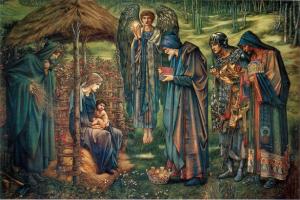Take any good excuse for a party. The Seventh Day of Christmas also brings the “new year” as we flip our calendars. The “new year” is a belated blessing. We entered new liturgical time on September 1 as the cycle leading up to the Nativity and eventually Pascha began in earnest.
The numbers in the common era, finding roots in attempts to date the birth of Jesus, will flip from 2020 to 2021. As a way of predicting the future, numerology is both ineffective and heretical. A number can be used symbolically in literature, naturally. When the Bible talks about “seven” or “forty” of a thing, this can carry theological meaning. Consult a commentary and see.
The numbers for our year are not predictive, but we can choose to give them meaning. How?
We can use the change of year as a symbol as we craft our life story. We can choose to use the arbitrary “new year” as a symbol of hope. Doing good is good and so any excuse to motivate something good will do. The new year can be a new day where I will love better: God and my neighbor. I can hope to achieve this goal and set about doing small actions to make this so. Trying to find a pattern and purpose in our lives and actions can help with planning as long as we recognize that in the end Divine Providence is impossible to see. Our story must be told lightly, as a provisional explanation of why we think we are doing what we are doing.
Telling a story that commends justice, mercy, and love is bound to do less harm than good! We can begin by finding reasons to hope, have faith, and love.
A resolution to commit charity is good and an outer prompt, the tradition of “resolutions at the new year,” is a fine prompt. First, joining our neighbors in a fine old custom has the benefit of acting in solidarity. My Hindu neighbor and I can join in a common act of pursuing something better in our neighborhood! Second, Christmastide as practiced points to taking an outer prompt and making an excuse for good (and a party!). The Romans loved our holiday so much that they probably appropriated it for a feast. Excellent! Today I am writing on Thursday, a name we borrowed from Norse religion. Maundy Thursday is no less holy. This too is excellent.
If I ask for hope, then my feelings may not change. Hope is a virtue and often comes with hopefulness, but not always. We can be in love without (at the moment) feeling very loving. When my children were small and would break a family heirloom while playing, I would feel frustrated while still loving them. I acted (when I acted correctly) on the love and not the frustration.
Living in hope is to act on the reality that the good, the truth, and beauty will triumph at the end of history.
The hope is there, always in the heart of God for us, we need only ask.












